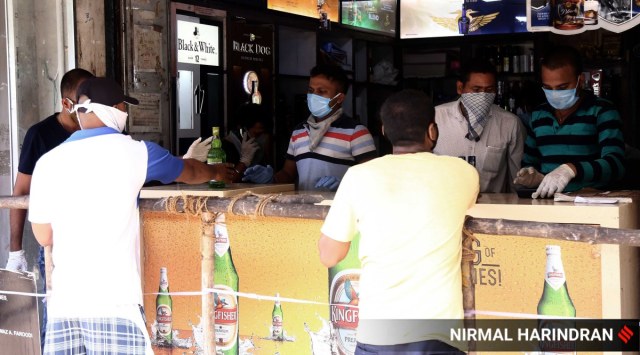PIL in HC challenges Maharashtra cabinet nod to sale of wine in supermarkets, stores
The PIL sought to declare the January 27 cabinet decision as "illegal" and "unconstitutional", and the same be quashed and set aside. Pending hearing of the PIL, the petitioner sought stay on operation of the cabinet decision.
 People at a wine shop in Matunga, Mumbai. Currently, only registered wine stores are allowed to sell wine. (Express Photo: Nirmal Harindran, File)
People at a wine shop in Matunga, Mumbai. Currently, only registered wine stores are allowed to sell wine. (Express Photo: Nirmal Harindran, File)A social activist from Ahmednagar earlier this week moved a Public Interest Litigation (PIL) in the Bombay High Court challenging the January 27 decision of the Maharashtra cabinet to permit the sale of wine in supermarkets and walk-in stores.
Currently, only registered wine stores are allowed to sell wine. Once notified, the new rules will allow sale of wine at walk-in stores or supermarkets with a minimum area of 100 square metres. This decision, however, will not be applicable across districts covered under prohibition orders, Wardha and Gadchiroli.
The government’s decision has invited sharp criticism from Opposition parties and social activists in the state.
Sandip Kusalkar, who runs an NGO called Yuvaan for youth empowerment and for underprivileged children, filed the PIL through advocate Filji Fredrick, claiming the state’s decision was directly contrary to the Government Resolution (GR) of August 17, 2011, which was aimed for de-addiction policy to curb proliferation addictions in youth.
“The said GR of 2011 speaks of efforts to be taken to discourage people from indulging in drinking habits and more importantly to de-glorify social status gained for alcohol consumption. It also speaks of duties of Gram Sabha in propagation for policy of de-addiction, and about formation and working of de-addiction committees throughout Maharashtra,” the plea filed on February 8 read.
“However, the cabinet decision of January 27 is directly contrary to the resolve of the government itself and it speaks loudly about making available an elaborate market for wine products and effective marketing for wine in Maharashtra and popularise wine drinking in the state,” the petitioner claimed.
It went on to state, “The said decision provides for “self-in shop” method, from which a person will be facilitated to make the purchase on his own without any supervision, on account of which the regulations in the 2011 GR about monitoring license for consumption and its adherence is impossible with self-serving purchase method.”
The petitioner said the present decision permits the sale of wine in supermarkets or at walk-in-stores to “popularise and familiarise the alcohol and alcohol consumption in masses of the state. This very objective of the cabinet decision is defeating the aim and object of de-glamourising the alcohol consumption and negating status acquired for alcohol consumption under the de-addiction policy mentioned in 2011 GR.”
“The cabinet decision is also contradictory to the limitation on the number of alcohol bottles one can purchase at one time as the service will help ‘self-purchase’, without interference of the shopkeeper or attendant. The age limit for purchase of alcohol is impossible to monitor and adhere to in the self-serving purchase method of wine in absence of any attendant or shopkeeper as is not provided,” the PIL said.
It added, “The decision only bars supermarkets/walk-in-stores near educational institutions and religious places from selling wine. The stipulation does not include other institutions like social institutions, government offices, parks, hospitals, libraries, state and national highways. It will not only make alcohol available in plenty, but it will create loopholes for those who want to bypass the legal bar on sale of alcohol near such institutions.”
The PIL sought to declare the January 27 cabinet decision as “illegal” and “unconstitutional”, and the same be quashed and set aside. Pending hearing of the PIL, the petitioner sought stay on operation of the cabinet decision.
The High Court will hear the plea in due course.







